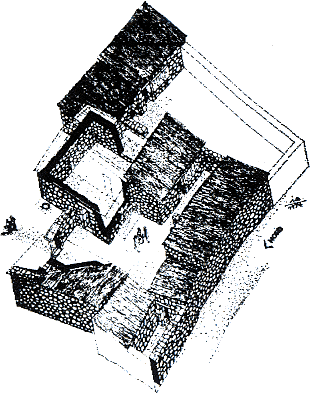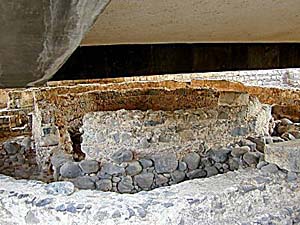Mood:
Topic: Sermon Staging Area
> BUMPER-STICKER THEOLOGY: Problem is that there's never enough room on a bumper sticker for the whole truth.
--> "Christians aren't perfect just forgiven."
--> True---Christians are not perfect, "nobody's perfect," chances are we won't be perfect until we are enjoying God's presence for eternity---BUT ...
--> The problem is, we become okay with that---sinning is a natural part of life, "I'm not perfect," "God will just have to understand."
--> We may be okay with that, but God isn't. ["Be perfect," {not saying perfect scores on every test but complete obedience to God} "Be compassionate," "Be holy"]
--> Not only that, if you have trusted Jesus Christ, you are already dead to sin: [Rom. 6]: Your Christian life should be a process of becoming what you already are in Jesus Christ.
> Because you are dead to sin, because the same Spirit that empowered Jesus lives in you, you can choose NOT to sin.
--> Why then do we still choose to sin? We don't stop sin where it begins. Sin never begins with your choices; sin begins in your mind. [Anger is rehearsed in your mind long before it explodes in your actions/Sexual relationships outside of marriage happen in the mind before they happen in the body/Revenge happens in your fantasies before it happens anywhere else.]
--> [[[Like bugs in a bug-zapper, we think we can get close to it in our thoughts but not affect our actions]]]
--> "Thoughts form choices, choices form habits, habits form your character, character forms your destiny."
--> I don't know about you, but I'd like to stop sinning ... I'd like to stop sin where it begins ... Will I be perfect before Easter? Maybe not---but I can do better, and so can you.
--> Between now and Easter ... SIX STEPS TO STOP SINNING.
> COMMON PROBLEM WHEN TRYING TO STOP SINNING: Illustrate: Do not think about a Koala bear, especially not in a pink dress, especially not with a lightsaber.
--> Why was it difficult not to think about it? (1) I caused you to focus on NOT thinking about it. (2) I put temptations in front of you to cause you to think about it.
--> "I'm not going to do it again": The sin becomes your focus; whenever the sin is your focus, no matter how much you don't want to do it, you will go back to it. Why? The same reason you couldn't keep from thinking about a koala---because what you focus on, you eventually do, and because the world around us constantly places reminders of the sin in our paths.
--> A sect in Jesus' day called "the bleeding Pharisees" because, to avoid lust, they made their entire focus in life never even to let their eyes rest on a woman: "He makes as if he shut his eyes, that he may not look upon women, and so runs and dashes his head against the wall, till the blood gushes out." Yet, in their minds, nothing was changed: [Matt. 23:27].
> STEP 1 TO STOP SIN WHERE IT BEGINS: Stop trying to stop sinning ... because as long as you're focused on the sin, you will never escape the sin.
--> "Don't try? I can do that!"---there's more, but before we can get there, [PSALM 25].
TEXT
> Read Psalm 25 and pray.
> Complex poem: (1) Acrostic/(2) Chiasmus: 1st and last will be similar, 2nd and next-to-last ... what is most important to writer, very middle.
--> Vv. 2 and 21: "I trust in you"/"I hope in you."
--> Vv. 2b and 20: "Put to shame."
--> Vv. 2c-3 and 19: "Enemies."
> Center: Verse 11: "For the sake of your name, Yahweh, wipe away my sin---there are so many of them." Sometimes, David's "enemies" are people; in this case, his enemies seem to be his sins.
--> "How do I deal with my sin?"
>> V. 9: Be honest, humble---admitting the real darkness that's in our minds.
>> Vv. 16-18: See what sin does. Sin wrecks relationships. [Vv. 2, 20: Shame]
--> When you're ashamed of something, natural response is to lie about it.
--> Why shame? When we sin, we become less than we were created to be.
--> That's why God despises sin in his people's lives---wrecks our relationships, break our hearts ... WOLF: Lick blade ... no matter how small, eventually some part of your heart/life/relationships will be left broken and bleeding by it.
>> Vv. 21, 5, 3: Stop looking for a quick fix. It doesn't happen instantly---that's what we're waiting for sometimes. It happens through the slow, hard work of seeking God.
>> V. 14: Look for God's real purpose: "Secret," "counsel": What you share with a friend: "Friendship with God is for those that fear him."
--> God's goal is NOT just that you stop sinning. God wants you to stop sinning so that he can enjoy a deeper friendship with you.
--> Whenever you have a deep friendship with someone, you want to get rid of things that stand between you---the primary goal isn't the stuff between you, it's the deeper friendship that you want to share.
--> "Fear"/"Friendship" seem contradictory: With God, there is fear---all-powerful, glorious, unable to be looked upon, despises sin---but there is also friendship, because this God delights in us.
--> James 2:21-23
RESOLUTION
> First step: Stop trying to stop sinning, start focusing on being God's friend.
> Everything you do, ask, "What will this do to my friendship with God?"
APPLICATION
> Fill your mind with that thought: When turn on TV ... / Cue song on CD ... / Respond to spouse or children ... / Click mouse on website ... / Look at someone ... : "I am God's friend. How will this affect my friendship with God?"
> COBRA, E.N.T...., Ortberg: "The most dangerous moment is when you're letting it go."
Thought for a future week ... No desire is bad in and of itself; God created your desires. What can be bad is how we fulfill that desire. Every sin you commit is an attempt to fulfill some unfulfilled need in your life. Bro. Lawrence: "Our sanctification does not depend as much on changing our activities as it does on doing them for God rather than for ourselves."





